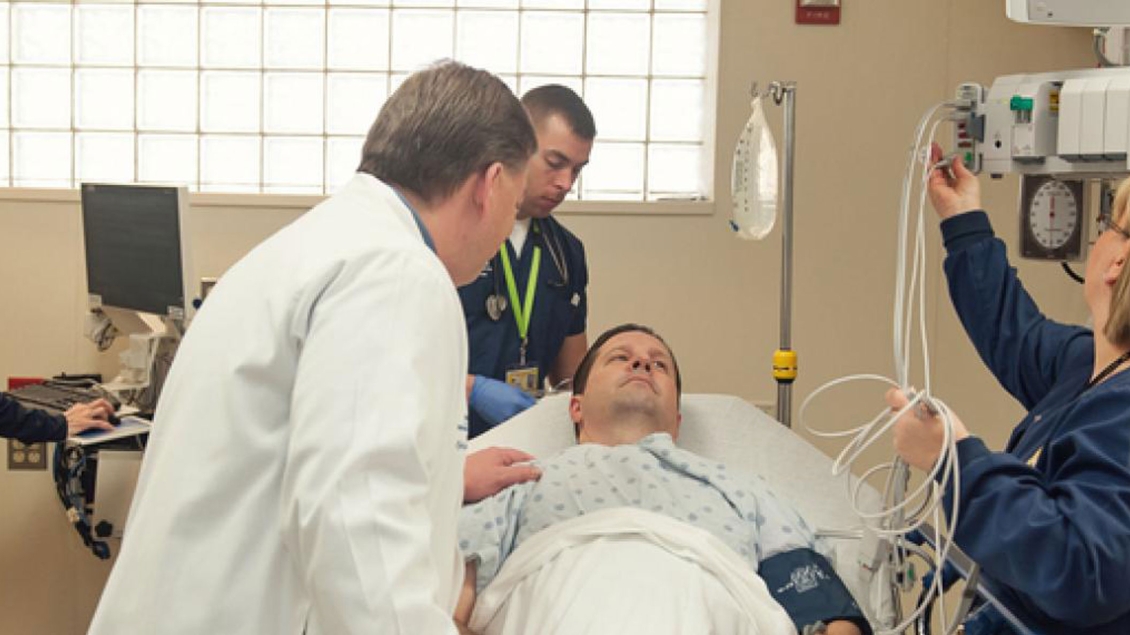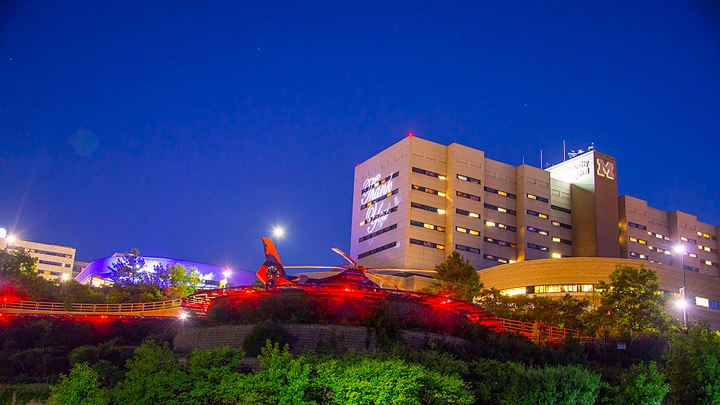
The Emergency Medicine Critical Care Fellowship at the U-M Medical School Department of Emergency Medicine is a two year program with two dedicated Emergency Medicine Fellows per year. Specialty certification pathway is either through Anesthesia or Internal Medicine.
Identical to both fellowship pathways:
ICU rotations: Medical, Surgical, Cardiovascular, Neurologic, and Emergency Critical Care Center
Electives: Cardiac (non-surgical) ICU, Trauma/Burn ICU, Critical Care Ultrasound, Pediatric ICU, VA ICU, Critical Care Nephrology, Infectious Disease, Palliative Care, Critical Care Nutrition, Radiology, Acute Pain Service, Airway (OR), Bronchoscopy, Research, and Survival Flight
The current medical campus complex includes facilities for the U-M Medical School, which was founded in 1848 as the Department of Medicine and opened to students in 1850. The medical campus complex also includes the Hospitals and Health Centers, which trace their history back to the nation's first university owned and operated hospital which opened in 1869.
The current hospital complex is a modern 865-bed, state-of-the-art facility, which has been consistently named one of the top fifteen hospitals in the nation, including the Frankel Cardiovascular Center, ranked the top cardiovascular center in Michigan by US News and World report and Mott Children’s Hospital, the only pediatric hospital in Michigan ranked nationally in all 10 specialties. The hospital serves as a referral center for the State of Michigan and the entire Midwest.
At this time, general Emergency Department (ED) shifts are not part of the curriculum. Fellows do spend time in the Emergency Department during their rotation in the Emergency Critical Care Center.
The Call responsibilities vary depending on rotation.
A wide variety of research is available to the fellows, enhanced by the traditional excellence of the U-M Medical School, consistent NIH funding, and opportunities with Weil Institute for Critical Care Research & Innovation.
We are most excited to initiate research in EC3, as the “hyperacute” resuscitation phase will provide endless study opportunities for fellows interested in the Emergency Medicine and Critical Care interface.
In addition to the outstanding education the fellows receive at a nationally renowned, quaternary care center, the following are some of the highlights specific to the U-M Medical School
The 9-bed Emergency Critical Care Center located in the Emergency Department and adjacent to 5 large resuscitation bays. EC3 is managed by the Division of Emergency Critical Care and staffed by board certified EM-intensivists and other EM faculty with additional training in critical care. The mission of EC3 is in harmony with the tripartite mission of the University which includes distinction in clinical care with data driven protocols, cutting edge acute critical illness research, and educating future leaders in Emergency Medicine and Critical Care. State-of-the-art devices and data collection systems help us achieve our mission in all three domains.
UM has been a leader in organ transplantation for over 50 years. Over this span, over 9,500 patients have benefited from this program. This makes us the largest and most experienced transplant center in Michigan--and among the largest in the nation. Transplants include; Heart, Lung, Kidney, Pancreas, Liver, Cornea, and Bone Marrow. Critical care fellows will manage the critical care needs of these patients in coordination with their respective transplant service.
U-M Medical School has been an international leader in the use of extra-corporeal life support with over 40 years of service. Fellows are responsible for accepting and arranging all ECMO transfers and consequently gain an understanding of the logistics involved in such a task. In addition, fellows are the only providers allowed to write ECMO orders and therefore exclusively manage the daily aspects of care. It is expected that the fellow participate in ECMO cannulation whenever possible. The ECMO service averages close to 100 ECMO cases each year.
In the SICU, the fellow is responsible for initiating and maintaining patients on CRRT therapy. Fellows are expected to write CRRT orders and become proficient in this therapy by the end of training.
Our flight program has been providing benchmark life-saving transportation of our most critically ill patients for over 40 years. Survival Flight is staffed by nurse-paramedics extremely experienced in critical illness and injury. The program has 3 new Eurocopter EC-155B1 twin-engine helicopters with a range of 350 nautical miles at a speed of 175 mph. The helicopters are equipped with sophisticated equipment to allow the expert crew the ability to transport complex critical care patients that require lifesaving support modalities such as IABP, ECMO, LVAD, and nitric oxide. Survival flight ride-alongs are encouraged and extremely popular among the fellows.
The University of Michigan offers highly competitive salaries and generous benefits to our fellows and advanced trainees. Trainee salary will be commensurate with that of a House Officer at an equivalent level of training based on the HOA contract.
Current fellows are training to become future leaders in emergency medicine. We emphasize teamwork, excellence, and leadership while preparing our fellows with resources to be successful in their careers.
- Katherine Wray Giarra
Kootenai Health, Coeur d’Alene, ID - Paul Valencia
The Ohio State University, Columbus, OH
- Mallory Abney
University of Michigan, Ann Arbor, MI - Adam Gottula
Texas IPS, San Antonio Methodist Hospital, San Antonio, TX
- Lane Smith
Atrium Health Carolinas Medical Center, Charlotte, NC
- Joseph Hamera
University of Maryland, Extracorporeal Life Support Fellowship, Baltimore, MD - Sharaf Khan
Advocate Health Care, Downers Grove, IL
2020
- Crystal Ives-Tallman
University of California San Francisco Fresno, Fresno, CA
2019
- Russell Day
United States Air Force - Peter England
University of Michigan, Ann Arbor, MI
2018
- Christopher Fung
University of Michigan, Ann Arbor, MI - Colin McCloskey
Case Western Reserve School of Medicine and University, Cleveland, OH
2017
- Joshua Glazer
University of Wisconsin, Madison, WI - Matthew Stull
Case Western Reserve School of Medicine and University, Cleveland, OH
2016
- Ivan Co
University of Michigan, Ann Arbor, MI - Carrie Harvey
University of Michigan, Ann Arbor, MI

Expand your career trajectory in a high-volume academic medical center that also supports and excels in a wide range of basic science, translational and clinic outcomes research programs.

We find a new reason to love Ann Arbor nearly every day — year-round outdoor activities, cultural experiences, a growing food scene, and a welcoming, family-friendly atmosphere are just a few that come to mind. Explore all that Ann Arbor and our surrounding communities have to offer.